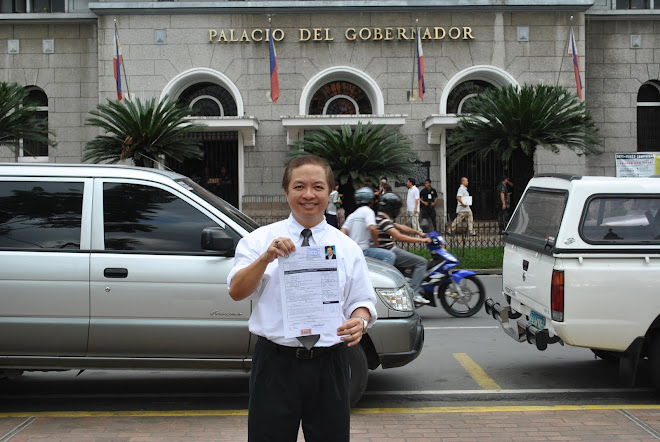Monday, October 6, 2008
Growing corruption
Editorial, Philippine Daily Inquirer
The bad news is bad indeed. The Philippines continues to slip behind in Transparency International’s Corruption Perceptions Index, an annual comparative listing of public perceptions about corruption in 180 countries (as of last count). The Index is highly subjective; it deals with perception, and therefore gives government propagandists elbow room for waffling. But the troubling thing is that the business community’s perception of the Philippines, first tracked last year, as the most corrupt major economy in Asia, as even more corrupt than Indonesia, seems to have already taken hold.
There are essentially two ways to understand the CPI list: through a country’s “score” (the farther away from 10 and the closer to 0, the worse it is), and through a country’s ranking (180 is the lowest rung).
At 141, the Philippines is in the bottom 40 countries. In 1995, the first year Transparency International’s “poll of polls” came out, it was at 36—out of 41 countries. In other words, from the very first CPI, the country has always brought up the rear. The only difference is that, in 1995, the rankings of the five original ASEAN member-countries had Indonesia last. (In fact, in 1995, Indonesia was at the bottom of the entire list, at 41.) Singapore was near the top, Malaysia was somewhere in the middle, and Thailand, the Philippines and Indonesia (in that order) were in the bottom part. That “pattern” has held steady since the start—until this year.
The Philippines’ score is 2.3 this year, the lowest ever. Indeed, since President Gloria Macapagal-Arroyo assumed office in 2001, the country’s score has fluctuated between 2.5 and 2.6—until it fell this year. (A score of 2.3 puts the Philippines on the same level of perception as Cameroon, Iran and Yemen.)
The fact that the Philippines “achieved” its highest score during the height (or the depths, depending on your point of view) of the Estrada administration (3.6 in 1999) can be interpreted in two contrasting ways. Critics of the Arroyo administration and members of today’s opposition can read this as undeniable proof that (a) allegations of corruption in the previous administration were exaggerated or (b) the current administration is simply more corrupt than the one it succeeded.
Defenders of the Arroyo administration can read the Estrada record as incontrovertible proof that the CPI is an unreliable metric because it is based, precisely, on perception. They can argue that the first full year of the Estrada administration benefited from the goodwill of the last year of the Ramos administration, when the country hit a score of 3.5. By the same token, they can also argue that the low initial score registered under the Arroyo administration (2.6, in 2001) reflects the scale of the corruption under Estrada, which came to full light only after his ouster.
There may be something to all this; the CPI, according to Transparency International, is "determined by expert assessments and opinion surveys.” There is therefore a whole lot of wiggle room.
There is also a question about the objective meaning of the rankings. The chaotic state of affairs in oil-rich Nigeria, for instance, is a fact of life. Any Filipino who has done business there can attest to the rampant corruption that unfortunately marks life in that particular country. And yet Nigeria, in the 2008 CPI, is perceived as less corrupt than Vietnam, Indonesia or the Philippines.
Despite these caveats, however, the CPI can still prove useful to policymakers. The real bottom line is clear: It is the perception of the business community, both inside the country and especially outside, that corruption has worsened. That perception cements the country’s one-year-old reputation as the most corrupt of the original ASEAN 5 members.
Government officials may quibble, but mysterious cases like the inexplicable flight of successful-businessman-turned-fertilizer-fund-financier Joc-Joc Bolante or the curious involvement of then-Commission on Elections chairman Benjamin Abalos in the National Broadband Network deal or the what-were-they-thinking disbursements of cash bundles for governors and congressmen right inside Malacañang have a real impact on public perceptions of corruption. Reality shapes perception.
The bad news is bad indeed. The Philippines continues to slip behind in Transparency International’s Corruption Perceptions Index, an annual comparative listing of public perceptions about corruption in 180 countries (as of last count). The Index is highly subjective; it deals with perception, and therefore gives government propagandists elbow room for waffling. But the troubling thing is that the business community’s perception of the Philippines, first tracked last year, as the most corrupt major economy in Asia, as even more corrupt than Indonesia, seems to have already taken hold.
There are essentially two ways to understand the CPI list: through a country’s “score” (the farther away from 10 and the closer to 0, the worse it is), and through a country’s ranking (180 is the lowest rung).
At 141, the Philippines is in the bottom 40 countries. In 1995, the first year Transparency International’s “poll of polls” came out, it was at 36—out of 41 countries. In other words, from the very first CPI, the country has always brought up the rear. The only difference is that, in 1995, the rankings of the five original ASEAN member-countries had Indonesia last. (In fact, in 1995, Indonesia was at the bottom of the entire list, at 41.) Singapore was near the top, Malaysia was somewhere in the middle, and Thailand, the Philippines and Indonesia (in that order) were in the bottom part. That “pattern” has held steady since the start—until this year.
The Philippines’ score is 2.3 this year, the lowest ever. Indeed, since President Gloria Macapagal-Arroyo assumed office in 2001, the country’s score has fluctuated between 2.5 and 2.6—until it fell this year. (A score of 2.3 puts the Philippines on the same level of perception as Cameroon, Iran and Yemen.)
The fact that the Philippines “achieved” its highest score during the height (or the depths, depending on your point of view) of the Estrada administration (3.6 in 1999) can be interpreted in two contrasting ways. Critics of the Arroyo administration and members of today’s opposition can read this as undeniable proof that (a) allegations of corruption in the previous administration were exaggerated or (b) the current administration is simply more corrupt than the one it succeeded.
Defenders of the Arroyo administration can read the Estrada record as incontrovertible proof that the CPI is an unreliable metric because it is based, precisely, on perception. They can argue that the first full year of the Estrada administration benefited from the goodwill of the last year of the Ramos administration, when the country hit a score of 3.5. By the same token, they can also argue that the low initial score registered under the Arroyo administration (2.6, in 2001) reflects the scale of the corruption under Estrada, which came to full light only after his ouster.
There may be something to all this; the CPI, according to Transparency International, is "determined by expert assessments and opinion surveys.” There is therefore a whole lot of wiggle room.
There is also a question about the objective meaning of the rankings. The chaotic state of affairs in oil-rich Nigeria, for instance, is a fact of life. Any Filipino who has done business there can attest to the rampant corruption that unfortunately marks life in that particular country. And yet Nigeria, in the 2008 CPI, is perceived as less corrupt than Vietnam, Indonesia or the Philippines.
Despite these caveats, however, the CPI can still prove useful to policymakers. The real bottom line is clear: It is the perception of the business community, both inside the country and especially outside, that corruption has worsened. That perception cements the country’s one-year-old reputation as the most corrupt of the original ASEAN 5 members.
Government officials may quibble, but mysterious cases like the inexplicable flight of successful-businessman-turned-fertilizer-fund-financier Joc-Joc Bolante or the curious involvement of then-Commission on Elections chairman Benjamin Abalos in the National Broadband Network deal or the what-were-they-thinking disbursements of cash bundles for governors and congressmen right inside Malacañang have a real impact on public perceptions of corruption. Reality shapes perception.
Subscribe to:
Post Comments (Atom)










No comments:
Post a Comment